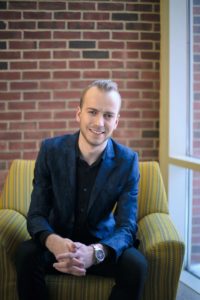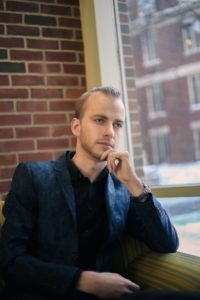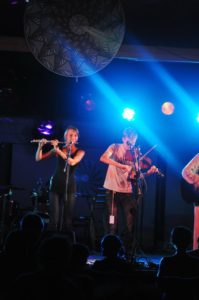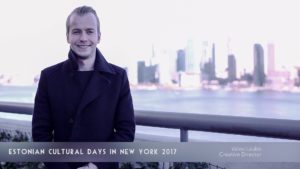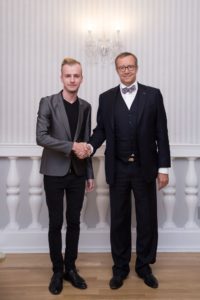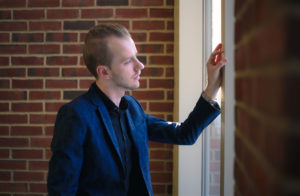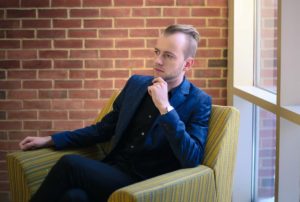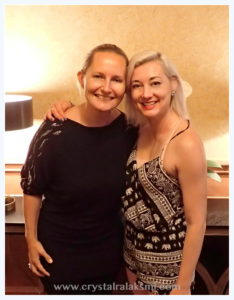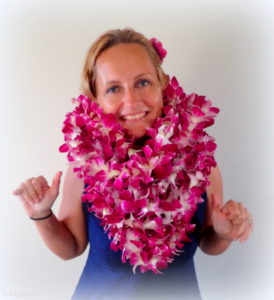I am so excited to introduce to all my fans a talented Estonian-born brand manager and designer based in New York City – Valev Laube. We have not yet met each other in one physical location, but we were introduced by powerful women based in New York, like an Estonian dancer Diina Tamm, artist Jaanika Peerna and a power-woman behind the Estonian Cultural Days in New York Kadri Napritson-Acuna.
We have followed each other’s lives with Valev via social media. I instantly admired Valev’s courage to create bigger events and choose challenges which most people would run from.
Even though I thought I am not going to produce more of these kind of interviews he inspired me to make an exception and here it is!
Valev Laube is an Estonian-born brand manager, artist, and designer currently based in New York. He’s an enthusiastic creative mind whose digital designs and social media projects have been the cornerstone of many New York-based festivals, events, and company brands.
Read more about who he is and what does he do and contribute to make this planet a better place to be?
Valev was born to a family of three children, in Varstu, Võru County. He has lived in Estonia, Italy and the United States and currently works as a graphic designer, social media coordinator and brand manager for various companies and private clients.
Most recently, Valev has worked on web presence and design project for Marquee Brand Builders, an internationally acclaimed brand consultancy. Formerly he’s worked for multiple design and branding companies, and help many projects such as Kalevala the Musical, Grapple Media, Orchard Breeze Companies, ReThink Pharmaceuticals and many other successes. During his work with a New York-based design and production company Sacatelle, he worked on designing promotional wearables for clients such as Kenneth Cole, Steve Madden, Coffee Bean & Tea Leaf, and others. A Vancouver-based magazine Metanoia mentioned Valev as one of the top upcoming brand managers to watch in New York City.
You have accomplished a lot and lived a very exciting life. Who and what made you be who you are today?
Honestly, it would be hard to point out a single person or location
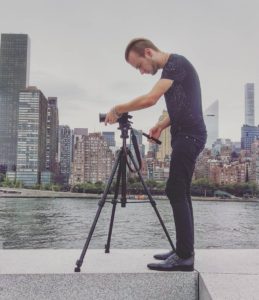
Valev Laube at the Franklin D. Roosevelt Four Freedoms Park in New York City preparing for an art exhibition “Kahn. Islander.”, 2017
that shaped me into the person I am today, a lot of credit goes home, my family, especially my mother who gave me amazing guidance without restricting me from dreaming big. Despite the scarce resources she taught me to be independent, dream big, and practice my professional curiosity.
At the age of fifteen, she supported my decision to move to the second biggest city in Estonia – Tartu, and always placed my adventurous desires above her own comfort. I could say that the solid foundation of my family allowed me to explore new territories and become independent earlier than most people. Looking back, I feel as every country and city that I’ve lived in gave me a perspective to life, which was all made possible thanks to her support as well as ability to allow me to explore the world on my own.
Where were your desires rooted?
When it comes to my professional and personal life, I would say that my desires are rooted in cultural connections and human emotions. It fascinates me to see how many people become affected by the country, society, or culture they live in and how sometimes cultures can be formed similarly across different societies.
While in branding and marketing it’s a lot about selling goods, services, or ideas to people that might not be familiar or receptive to these ideas, it’s still interesting to see the common grounds that people share. Often people use different concepts, or works to express a similar fear, desire, or dream.
My siblings’ close connection to music and specifically to Estonian folk music has helped me see and notice cultural details and traditions also in other countries. The evolutionary aspects and progress of collectively created folk music, art, or literature is relevant in so many fields beyond just arts. While studying in Italy, I mainly focused on philosophy and economics, which, despite their distance from the arts and cultural studies, also relies on similar aspects of human behavior.
More recently my professional focus on design and branding has made me realize how my background facilitates my understanding of brands and visual identities. In the modern age brands are heavily rooted in our sociopolitical environment. Like in case of folk music, we pass onto our children knowledge about brands, and the roles various visual identities play in our daily life. In capitalist society commercial identities have become a part of our cultural heritage which we create and share within our communities. Our ability to interpret and connect with visual identities are shaped by the education and understanding that once was passed onto us, and the cultural context we were raised in.
So overall, no matter if I’m working on a web presence project for an artist, finance firm or a festival, I like to learn about the audience that it serves, and the way their community has been formed. Brands are not just representations of business, but they evolve throughout time together with their patriots. Every brand or visual identity needs to be able to support, and inspire their community.
Your biggest dream in life right now?
I look forward to being permanently back in New York City starting May 2018 and use my skills to continue making a difference through projects that generate new energy. Over the last eight years I have had an opportunity to live in three countries and five cities. While it’s been an exciting journey I look forward to being back in New York and building more long-term relationships with people and projects that come my way. Eventually, I would love to work towards building my own company that would help people with exceptional ideas or talents, and bring them to a wider audience with the help of design, marketing, and public relations. It breaks my heart whenever I meet talented individuals with flaming passion, yet their voices or stories are discarded because of a single perceived character “flaw”.
What have been your keys to living your life on your terms?
I would say not agreeing to live by humanly created stereotypes, no matter if it’s the expectation set based on a person’s age, gender, gender identity or societal context. I think the more we listen to the labels we’re expected to wear the less we focus on ourselves. I don’t like to identify myself or my happiness in those terms.
I remember being a high school student while doing graphic design work to companies in other countries around Europe. I couldn’t talk about them or share my worries, because the community around me wouldn’t understand it or perceive it as being worthy of consideration.
I remember going to college in the US, during the first week I was asked about my course selections as if the course I choose from a list could define me and my passions.
I think my principle has been do not use labels to define what I do and rather build relationships with individuals who have a passion for something. For me passion always comes first, because it’s the fuel to progress and constant personal growth. Every meeting with someone new is too valuable to bring pre-defined labels from the previous conversation into this moment.
Your message to the world?
Stay humble, live your life, and be open to the world. Every human was born to some pre-existing society which shaped them, but it’s important to acknowledge that it’s not what defined them. A birth country, or cultural context is given to us and we shouldn’t take it for granted either should we take it as ultimate truth.
My way to happiness was first focusing on myself, trying to figure out who I am, before I let political, societal, or cultural concepts push me into a certain box.
What has been the hardest moment of your life? How did you get through it?
The hardest moment was transitioning from a post-Soviet tiny village to a small sized city, and then to an elite international high school, which finally brought me to New York City. It’s very comfortable to stay and live where one is born, moving or traveling can be a challenge on its own, but for me the hardest part was hiding my background or my story, because it wasn’t the norm and people wouldn’t understand my story of coming from a near-poverty level household and ending up in one of the world’s biggest stages for digital media and brand related design.
I think for a while, I forced myself to hide my background to be taken seriously and considered for my thoughts and knowledge instead of seeing me as a “poor kid who has made it in the city”.
I think it’s very common for people to perceive others from a different economic class as opportunistic, or as a charity case. I didn’t want to belong to either.
I wanted to be taken as seriously as anyone else, yet not too seriously just because in their eyes, I tried to impress them. I wanted to belong and therefore be considered or ignored as much as anyone else. I wanted to learn about the specific community that has become close to me. These transitions happened when I moved to Italy, as well as the first time I moved to New York City.
At times I would not talk about my background or finances, because I didn’t want to be seen as an “Eastern-European” who was seeking for help, or as an “Eastern-European” who was doing business in town. I’ve lived in multiple cities within the US and in my experience the smaller the city gets, the more opinionated people’s views on North-Eastern Europeans get. I didn’t want to be seen as someone who has “made it” simply because I’m in the United States, that to me is a very limited view.
I simply wanted to continue my journey and keep climbing the ladder. I’m still not sure if it will bring me back to Europe one day, or to some place in Asia or Latin-America. In my eyes every time I take a step up, my own expectations and dreams kept getting bigger. I didn’t want this to end or start thinking of myself as a success story, nor as a beggar.
Your most inspiring moment of your life?
It was a few years back in Budapest, I was there doing some volunteering for a homeless shelter, and after a long day at work we went to a bar and met a group of young people backpacking across Europe. They were from Poland, and I kept talking to them to squeeze out every fascinating bit of experience they’ve had.
I remember them saying how they started the trip with nearly no money but a lot of curiosity. I bought them a drink to hear more about their exciting adventures across Europe. It was a dream of mine to be as courageous as them and be able to simply leave for a few months my home at the time. I keep thinking about it sometimes. Usually, while other people were grooving to travel to Ibiza and enjoy their sugary cocktails by the sea, I kept dreaming of challenging myself and hitchhiking across Europe. I was fascinated by the idea of meeting so many different people along the way and trusting my own well-being into the hands of complete strangers.
The Polish group told me about one time when they slept at someone’s house who used to be a WWII refugee in Austria, she worked herself up and founded a company, then a few decades later it went bankrupt. Now she lives in a small apartment and volunteered to provide shelter. She gave them one life lesson that really resonated with me.
It was that she couldn’t care less about home, as a house, or an apartment, but home is where you are as an individual.
Once humans become so distanced and wrapped around their idea of eternal comfortability, they tend to build an emotional barrier around themselves. Once a person distances himself from other people to a point where he isn’t able to talk to a complete stranger and give a helping hand, then that’s the end of progress.
I remember how these Polish backpackers were like a reflection of my alter ego, yet they had the courage to go out and explore humanity with minimal financial assets, sometimes beg for help, other times provide a helping hand themselves. I still haven’t overcome my fear of hitchhiking long-distance, but just a year later I managed to fly to Frankfurt, get a bus ride costing me four euros to a nearby city, and then hitchhike to my partner’s house in the South of Germany. It might have been a small step for some, but a huge step for me.
Your relation to money?
Money is a weird tool. While a lot of my fears of the past have revolved around money, I tend to know that it’s not what makes us happy. Too little of it can make us anxious, and push us off the tracks, but it’s not what builds relationships or facilitates good ideas. To me, idea is not worth a million dollars, it’s worth the heart of a million people.
What is financial independence for you?
It means knowing your own value and the utility you can bring to people’s life.
How do you maintain yourself financially?
It’s a complicated situation, which depends on a lot of things. Most of my income comes from my digital branding and promotional work. I’ve also been grateful to receive many scholarships in the past and cover all my previous studies here in the US, and in Italy. Throughout all this time freelancing was always a big part of my financial independence, sometimes it grew out of volunteering projects, other times I was commissioned to do the work.
Currently, I’m again in the transition from an academic and freelance combination to potentially working full-time for an agency in New York City. It’s hard to say what’s right or wrong, but I would never underestimate the power of connections and how freelance projects can lead to full-time positions or how it can increase your value as an expert in the industry.
It’s the direction many industries are moving towards and anyone with a unique set of skills should think of building their own brand and providing services independently.
How do you know Crystal and what do you admire about her?
Crystal and I got to know each other through a mutual contact, a New York-based dancer and choreographer Diina Tamm. Crystal’s positive energy and forward thinking online business has always inspired me. She is an energetic character, probably one of very few people who has inspired me the same way that these Polish bag packers inspired me to take risks and live my own truth.
Such a simple yet scary concept to bring more control and happiness to our lives, yet often we’re too scared to accept it. We’re raised to think and act within a certain framework that often makes us worried about financial conditions, social judgement, or not fitting the norm. I love her inspiring story, youthful and positive outlook, and enthusiasm. Keep up your amazing work Crystal!
What was the biggest accomplishment of the year 2017 for you?
2017 for me was a year of preparation, mainly preparing myself to potentially be completely independent as a brand manager in 2018. I focused on building relationships with various clients and doing preparation work for a few big productions coming up this year.
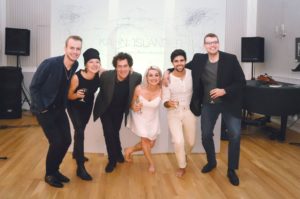
Performance artists and organizers of “Kahn. Islander.” – an art event dedicated to the work of an Estonian-born American architect Louis Kahn.
In 2017, I was the creative director of the Estonian Cultural Days in New York for a second year in a row. Together with an executive director Kadri Napritson-Acuna, we brought together an audience of almost 200 people and treated our followers with amazing performers such as Ott Lepland, Tanja Mihhailova, WAF choir, and many others. As I try to keep my passion for composition, arts, and violin alive, I put together a multidisciplinary concert “Tonality of Culture” which specifically addressed the changes taking place in Estonian folk music, and how contemporary artists use instrumental playing techniques to create modern folk-pop sounding music. The concert was part of the European Culture Week at the National Gallery of Art in Washington, D.C.
Towards the end of the year I managed to work with many amazing artists, and companies to lay out plans for incredible upcoming projects in 2018 such as Kalevala the Musical, Kristi Roosmaa’s short film “Wildflower”, ExSpace’s Augmented Reality exhibition “Rochester Subway”, and the grand Esto-Atlantis Concert at Lincoln Center.
You have also released your own art collections. Where can we find them?
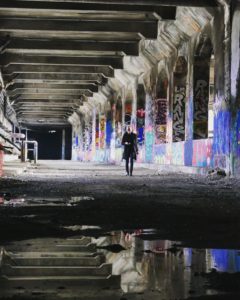
Exploring and documenting the street art and graffiti artworks located at the abandoned Rochester Subway space, closed since 1956.
Yes, aside from my brand related management and design work I tend to publish artist books and release art collections occasionally. Many of these are available on my website, the photography books can also be found on Amazon.
While digital artworks, artists’ books, and music have taken a step back, I tend to release something artistic in about every six months. These projects keep me inspired artistically and provide a spiritual escape from the commercial brand focused business world.
How can people get in contact with you?
The best way is to visit www.valevlaube.com and contact me there.
Thank you for contributing to my blog. I so appreciate it!
***
Final notes from Crystal Ra:
This interview was pulling me back to something I have always loved so much and that been so close to my heart – to find out more about people, their stories and what do they think, do and choose to make their lives to stand out and live meaningful lives which will not only contribute to few but maybe even to many generations later.
This kind of communication and connecting ties in all my years of studying social- and visual anthropology, it is why connecting and talking to Valev was so heartwarming and nourishing. I am so happy to share it with the world.
I know that the future will be built with people who are global, opened and cooperative not only beyond their original state or countries, but beyond continents and cultures.
My Estonian clients and friends, will have another chance to meet Valev via my video interview with him in our VIP club very soon and I have a feeling we may co-create something bigger together in the future too.
I hope you all enjoyed this little inspiration from New York and Hawaii. May you all live the grandest version of you!
Best wishes and Mahalo.
***
Crystal Ra Laksmi-Ditton is an Estonian-born self-development entrepeneur, who has lived in Denmark, Norway, South Africa and Mexico, travelled to 30 countries and currently resides in Hawaii, USA with her husband Michael Ditton.
She has a bachelor degree in social anthropology and masters in visual anthropology and has produced two documentaries. Currently she is working on her new book series and also on many online courses and blogs to inspire and motivate people to live their highest potential wherever they are and wherever they come from.
Crystal Ra and her husband are also developing new possibilities and a brand ‘Infinite Activation’ together to combine the best of their talents and skills.
Crystal Ra believes that we can all become who we desire to be, we just need to choose it and work for it – even if it seems unreal in the beginning. Her own life is a proof that sometimes fairytales can become reality.
***
Revisit amazing previous inspirational interviews with Diina Tamm, Kai Wallin, Joylene Nowell-Butler, Janet Hudson, Sonny Davis, Katrin Haiba and Michael Ditton here:
Feel free to leave your comments below this interview.

